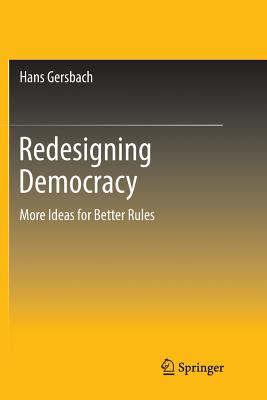Strategic Voting (Synthesis Lectures on Artificial Intelligence and Machine Learning)
暫譯: 策略投票(人工智慧與機器學習綜合講座)
Reshef Meir
- 出版商: Morgan & Claypool
- 出版日期: 2018-06-11
- 售價: $2,900
- 貴賓價: 9.5 折 $2,755
- 語言: 英文
- 頁數: 167
- 裝訂: Hardcover
- ISBN: 1681733617
- ISBN-13: 9781681733616
-
相關分類:
Machine Learning
海外代購書籍(需單獨結帳)
相關主題
商品描述
Social choice theory deals with aggregating the preferences of multiple individuals regarding several available alternatives, a situation colloquially known as voting.
There are many different voting rules in use and even more in the literature, owing to the various considerations such an aggregation method should take into account. The analysis of voting scenarios becomes particularly challenging in the presence of strategic voters, that is, voters that misreport their true preferences in an attempt to obtain a more favorable outcome. In a world that is tightly connected by the Internet, where multiple groups with complex incentives make frequent joint decisions, the interest in strategic voting exceeds the scope of political science and is a focus of research in economics, game theory, sociology, mathematics, and computer science.
The book has two parts. The first part asks "are there voting rules that are truthful?" in the sense that all voters have an incentive to report their true preferences. The seminal Gibbard-Satterthwaite theorem excludes the existence of such voting rules under certain requirements. From this starting point, we survey both extensions of the theorem and various conditions under which truthful voting is made possible (such as restricted preference domains). We also explore the connections with other problems of mechanism design such as locating a facility that serves multiple users.
In the second part, we ask "what would be the outcome when voters do vote strategically?" rather than trying to prevent such behavior. We overview various game-theoretic models and equilibrium concepts from the literature, demonstrate how they apply to voting games, and discuss their implications on social welfare.
We conclude with a brief survey of empirical and experimental findings that could play a key role in future development of game theoretic voting models.
商品描述(中文翻譯)
社會選擇理論處理多個個體對幾個可用選擇的偏好進行聚合的問題,這種情況通俗地稱為投票。
目前有許多不同的投票規則在使用,文獻中更是有數不勝數,這是因為這種聚合方法需要考慮的各種因素。在存在策略性選民的情況下,投票場景的分析變得特別具有挑戰性,策略性選民是指那些為了獲得更有利結果而錯報其真實偏好的選民。在一個由互聯網緊密連結的世界中,許多擁有複雜激勵的群體經常共同做出決策,因此對策略性投票的興趣超出了政治科學的範疇,並成為經濟學、博弈論、社會學、數學和計算機科學的研究重點。
本書分為兩部分。第一部分探討「是否存在真實的投票規則?」即所有選民都有動機報告其真實偏好。開創性的Gibbard-Satterthwaite定理在某些要求下排除了此類投票規則的存在。從這一出發點,我們調查了該定理的擴展以及在何種條件下可以實現真實投票(例如限制偏好範疇)。我們還探討了與其他機制設計問題的聯繫,例如為多個用戶定位設施。
在第二部分,我們探討「當選民進行策略性投票時,結果會是什麼?」而不是試圖防止這種行為。我們概述了文獻中各種博弈論模型和均衡概念,展示它們如何應用於投票遊戲,並討論它們對社會福利的影響。
最後,我們簡要調查了可能在未來博弈論投票模型發展中發揮關鍵作用的實證和實驗發現。











